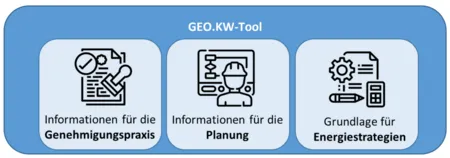Berlin has committed to becoming climate neutral by 2045, with the heating sector playing a crucial role as it accounts for nearly half of the city’s CO₂ emissions. A key component in reaching this target is the expansion of shallow geothermal energy use.
The GEO.KW Tool Berlin project aims to develop a digital tool for assessing and managing the shallow subsurface in support of municipal heat planning. The goal is to improve the availability of the relevant data and the methods for feasibility assessments in order to streamline planning and permitting processes for shallow geothermal systems.
The Berlin Senate Department for Mobility, Transport, Climate Protection and the Environment (SenMVKU) has commissioned the Chair of Hydrogeology at TUM to carry out this project by building on a tool which was originally developed and successfully tested in Munich. The existing GEO.KW-WebApp will be adapted and its capabilities expanded to meet Berlin’s specific needs and the different geological and hydrogeological conditions.
Contributions to SDG

Funded by
Responsible
Project duration
01.09.2024 – 30.08.2028





